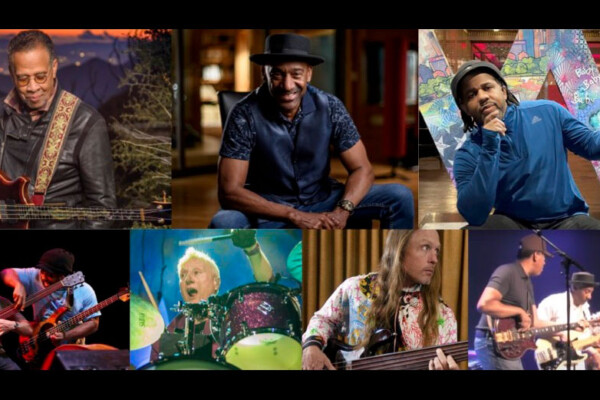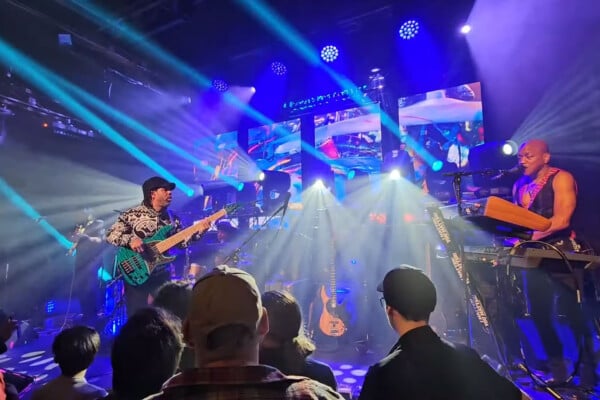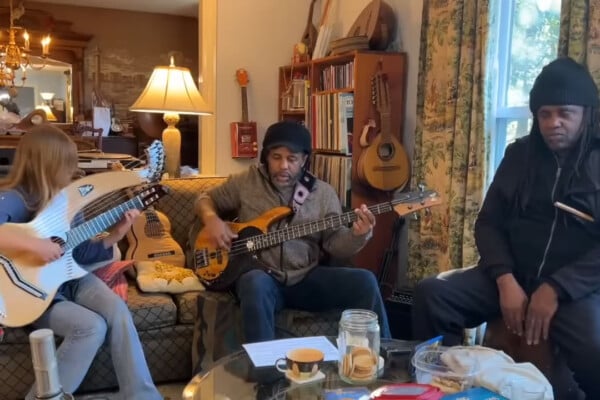The Spirit of Music: An Interview with Victor Wooten
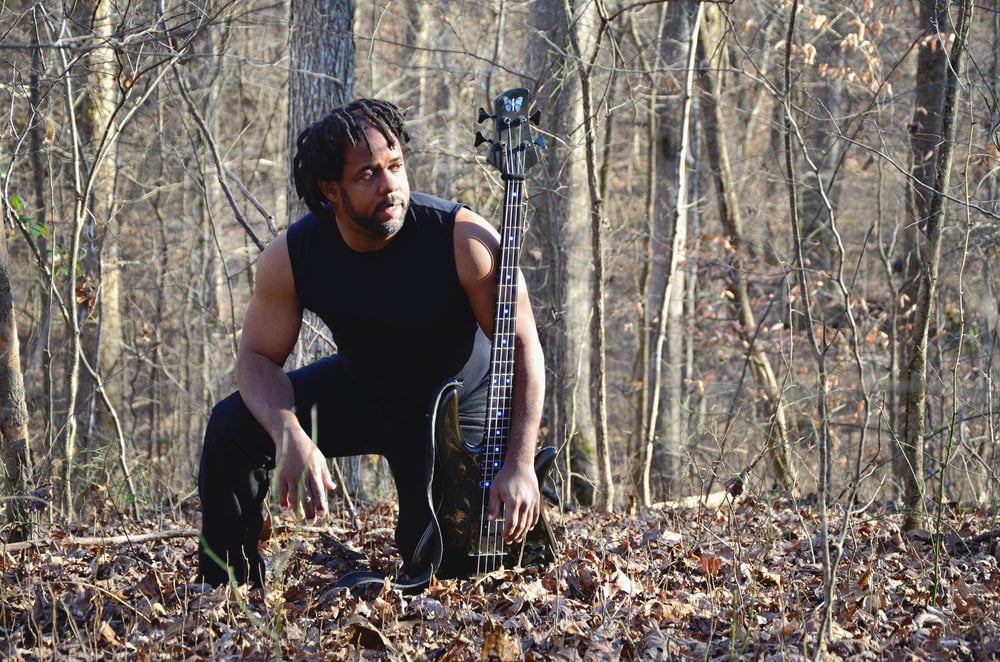
Even in the middle of a pandemic, Victor Wooten is not sitting idle. He’s been co-hosting webinars with Steve Bailey that feature roundtable discussions with the world’s best bassists. He’s moved his famous camps at Wooten Woods to a virtual setting. He’s also just re-launched his merch website, VixMerch.com, with lots of new and rare goodies.
That includes one of his personal basses signed by over 30 legendary fellow bassists and the introduction of a signature strap by Ergo. Wooten also used the opportunity to unveil a new novel called The Spirit of Music, which serves as the followup to his smash success The Music Lesson.
Maybe most importantly, he’s been using the time to reconnect to himself and his family. It’s also his time to recover physically. The master player recently contracted dystonia, a movement disorder that causes his hand muscles to contract involuntarily. As such, he’s been laying off the bass as much as possible and working on bettering his condition.
We caught up with him to talk about his new book, how he’s dealing with dystonia, the upcoming Bass Extremes album, and more.
How have you been faring through this pandemic? It seems like things are starting to open up a bit.
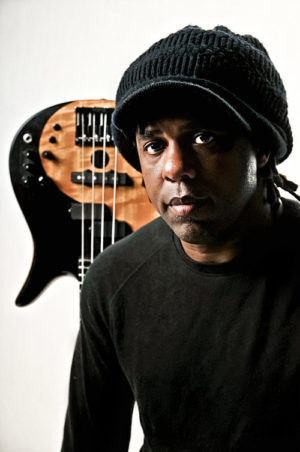 Well, they’re starting to open up a bit, but I don’t know that they should be. Where I am in Tennessee – and I know we’re not the only state – it seems that that the COVID cases are skyrocketing now that they’re opening up. I may be wrong about this, but from what I hear, we went to phase three even though the data said, “Don’t do it.” I know that the economy has taken a hit, but so are humans. So I guess that’s the balancing act, and I think people are going with the economy first.
Well, they’re starting to open up a bit, but I don’t know that they should be. Where I am in Tennessee – and I know we’re not the only state – it seems that that the COVID cases are skyrocketing now that they’re opening up. I may be wrong about this, but from what I hear, we went to phase three even though the data said, “Don’t do it.” I know that the economy has taken a hit, but so are humans. So I guess that’s the balancing act, and I think people are going with the economy first.
But for the most part, I’m doing very, very well. The main thing for me is that I was planning on not touring next year, anyway. My booking agents, my tour manager, my overall manager… Everybody knew it. I wasn’t going to make it public because if I don’t show up in your town for a year, nobody notices. A year goes by so fast and there are enough musical acts out there. My kids are growing up, and I haven’t been home a full month of their lives. That’s horrible. So I was planning this anyway, and all of a sudden nature or whatever you wanna call it said, “No, you’re going to do it now.”
So I’ve actually been enjoying it – really enjoying it. I mean, I’ve had to play quite a bit more than I had planned. I’m online more than I had planned, but I’m home earlier than I planned and just loving it. My wife and three of my four kids are home. We’ve been getting lots done, cleaning out rooms that we should have cleaned 30 years ago.
I realize all that in recognition of the fact that a lot of people are getting hit hard for different reasons, some because of COVID. I’ve got friends and relatives who either have been sick or are sick and some that have even died. My 30-year-old cousin died of COVID about a week and a half ago, maybe two weeks now. [COVID] is a real thing, but it doesn’t mean I have to sit here and be sad about it. It makes me want to live more fully and not shut down, but open up and go inside and know who I am. If they’re telling us to be inside, then I’m gonna go deep inside and really make myself better.
Something I talk to musicians and people in general about is that I can sit here and know that I’m okay because of past decisions that I’ve made. Life choices, monetary choices, paying attention to the money that comes in, and what to do with it, not being too frivolous. So when times like this hit, I don’t have to worry right away. I mean, if this goes on too long, then I’ve gotta figure it out, but it’s [ok because of] past decisions.
A lot of times this you can predict your future based on past decisions that you made. Not even predict it, but create it. We practice instruments so we can be good later. You practice so that even unconsciously, you’re going to do what’s right. You’re gonna do what’s good for you in music. We understand that when it comes to music. People practice bass all day and work on their scales, but in life, we don’t do that. We kind of take it day by day as it comes. Fortunately, I learned a different way as a child, and it’s paying off right now. It paid off for my parents and it’s paying off for me and my brothers. So anyway, that’s all to say that I’m enjoying myself by being smart, being healthy mentally and physically, and reaching out where I can to people that need some help.
What kind of advice do you have for people that are hit hard right now?
The main thing I’m telling people don’t just focus on what’s wrong with right now. Look at what’s going right. One of the things I’ve been asking people to do is to just literally write down everything that you’re doing differently because of this pandemic. Write it all down. Don’t judge it yet. Just write it all down. Maybe you’re sitting down more, maybe you’re actually exercising more, maybe you’re playing more video games – it doesn’t matter. One kid at Berklee College of Music said he’s cooking with his parents. He said, “We’re not good, but we’re just enjoying each other.” Another guy says, “I don’t even like people, but I’ve been calling my friends just to talk.”
No matter what it is, make a list. Once you’ve made that list, go back through it and put a checkmark on the things you want to continue once the pandemic is over. Maybe you want to keep cooking with your parents every chance you get. Maybe you want to call your friends. Maybe you want to get out and take more walks. Who knows? Maybe you want to wear a face mask every time you get a cold, not because you don’t want to catch something but you don’t want to give what you’ve got. Maybe you want to keep doing that like they do in Asia. They’re smart like that, you know?
So whatever it is, make a list and put a checkmark by the things you want to continue and then start doing that. Really make that a habit so that you don’t have to think about it anymore. To me, that is a way of assuring that we don’t come back to normal after the pandemic because normal is what got us here. We shouldn’t be shooting for normal. We want to come back better than normal, and it starts with us and what we do and how we think. You make it conscious. You’ll say, “Oh, wow. I do this a lot. I want to continue doing this part of it, but not that part.” Then you work on it today. Not tomorrow – today. This is a sure way that you come back better.
A lot of people I feel lost right now and I believe the main reason we feel lost is that we can’t do what we normally do. Many of us define ourselves by what we do – so much that we’ve forgotten who we are. Right now we’re forced to face who we are, and we don’t know who that is so we think we’ve lost ourselves. No, this is your time to find yourself. Recreate yourself. Express yourself. Make it better.
Most of the world knows me as a bass player. That’s what I do, [but] that ain’t who I am. If I had to write who I am, bass player is not really who I am. My kids don’t care about that. My wife doesn’t care. Yes, that brings income, but I do that to bring income. Who I am, hopefully, is a good person, a kind person, a person who thinks, a person who sees, a loving dad, a loving husband, a person who wants to make the world better every time I take a step or a breath. To me, that’s who I want to be and hopefully, it’s a part of who I am. Right now in knowing and even improving who I am, when I bring that back to what I do, what I do has to be better, you know? I can literally put down what I do and put my bass down. We’re all being forced to do that, which is making many of us lost because we define ourselves by what we do. In many cases, we hide behind what we do. Many of us don’t even want to face who we really are.
Is that something you struggled with before or is it something you always understood?
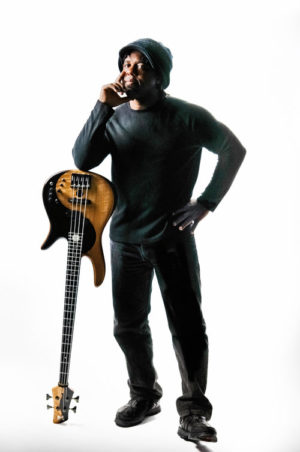 I always understood it because my parents and my brothers made sure of it. Now, I’m not brilliant or clever. I’m lucky if you want to call it that. I was born to the right people at the right time. I had two of the wisest parents, and before I was born they raised four incredible boys. When I was born, it was like I had six parents because of my four older brothers.
I always understood it because my parents and my brothers made sure of it. Now, I’m not brilliant or clever. I’m lucky if you want to call it that. I was born to the right people at the right time. I had two of the wisest parents, and before I was born they raised four incredible boys. When I was born, it was like I had six parents because of my four older brothers.
My parents were real, and I mean it in every sense of the word. They were born in the thirties a heavily racist time with inequality for people of color as well as women, Dad was in the Korean War fighting for a country that didn’t support him. You either get beat down by that system or you learn to pick yourself up, and they learned to thrive through it and raise their kids in a way that we knew who we were even though we were living in a world that didn’t support who we were. Both our parents instilled confidence and the knowledge of self. Even in school, we had to get good grades. We had to know how to type. My three older brothers literally had to enter into speaking competitions because our parents wanted to make sure we knew how to voice ourselves and speak properly. Yeah, you speak one way in the hood, but in the world, you don’t speak like that. People will put you down and look down on you. So not only do we know what to say, we knew how to say it.
You can ask a musician if they’re any good and they’ll say, “Well, you know, I try. I’m ok.”
Why lie? If you ask me or any of my family, “Are you a good bassist?” I’ll say I’m a great bassist. I mean, that’s not bragging. That’s the truth. But even as great as I know I am, I know that I’m no better than you, because if somebody wants you to play bass on their record, I’m not good enough to be you. So we learned how great we were, but we learned that we weren’t better than anyone else.
We’re all great and so we learned to see everybody that way. Whether or not you see it in yourself, I’ll see it in you for you. If you can’t even see that, then see it in me. I’ll show you how great I am. That at least lets you see what greatness is. I’m not gonna diminish myself to try to make you greater. That’s silly. No, I’m gonna show you greatness to help raise you up. Put me on a pedestal? Great. In a little while, we’re both gonna be up on that pedestal. I’m not coming down. I’m great. Absolutely. I’ll be the first to tell you that, but I’ll be the first to tell you that you’re great. Hopefully, I’m the second to tell you that. Hopefully, you’re telling yourself. But you’re great, whether you see it or not I already know it. I can’t be you.
I was born into that, so I have that confidence and I have that self-knowledge, but I still have the drive to improve. My number one goal now, especially after becoming a father, is to help others realize who they are.
That’s a whole other can of worms.
There’s a fine line of what I’m talking about, especially in this entertainment world. I can have the worst show ever, but everyone’s gonna tell me how great I was. It’s really easy to start believing that too much and thinking, “Well, I don’t even have to practice anymore because regardless of what I do, people tell me how great I am.” You can start to cross that line to take your greatness to mean that you’re better than others, and that’s not what it means.
We all have to check ourselves often and have friends who make sure that you’re checking yourself and things like that. [It’s important] to have friends that will tell you the truth, making sure you’re the friend that will tell someone the truth. I’m trying to share this information with people so that they love themselves again, and I do it through music. I do it through my records. I do it through my books. I do it through teaching and running my camps.
Music brings people to me, but hopefully, they leave with more than that. Music for me is an outlet, but I’m using it more these days as a way to reach people. Not to preach, but just help people know that that you’re enough. You don’t have to do anything to be great. Just the fact that you were born makes you great.
I tell people all the time that we know what it takes to be born. You know Mommy and Daddy come together, but after that, it’s a mystery. It’s magic after that. We don’t know how or why, but the result is that you were born. You weren’t the only choice. There were maybe millions of choices that it could have been, but in some kind of way, it was you. You already won the lottery or competition or whatever you want to call it. You already won. You don’t have to do anything. Whether you sit on your couch for 100 years and do nothing or you get out and win a Nobel Peace Prize, it doesn’t matter. You’re already victorious and it’s the biggest competition, lottery, race, or whatever you want to call it that you will ever enter.
You have these [fingerprints] on the end of your fingers, and yours have never been here in history – past, present, or future. Like a barcode in the grocery store, you scan that barcode and it points to only one product. This points to you, out of all of history. Nothing can change that. Nothing. But the fact that we’re humans and we have a thing called choice, we get to choose what to do with that victory. To me, that makes the victory more powerful. Now that you know you’ve got that, you must make wise choices.
I tell people that so that they realize, “Wow, I’ve got something no one else in the world has ever had or will ever have.” Imagine having the only jewel, diamond, or ruby in history. Not just during your lifetime – in all lifetimes – and you got the only one. Imagine how valuable that would be. Well, you’ve got something more valuable than that, and it can’t be stolen from you. That’s powerful.
I’m getting all amped up.
Well, we all should be. That’s the way life is. Life is designed for us to be amped up, literally. We have the wattage, the power, the amplitude to create. It just takes a little getting amped up, and the more amped up you get, the faster it happens.
We make these things happen. We’re so normal at making things happen that we don’t realize what a miracle it really is. In many cases, we don’t even realize that we’re doing it, to the point that when something really good happens, we give the credit somewhere else. Now it’s popular to give it to the universe. People say, “Well, I’m going to see what the universe says.” The universe is waiting on you! [laughs] A lot of us are sitting back waiting and when it doesn’t happen, we blame something.
We are pure magic. There’s no one who can tell you what you really are. Where do your thoughts come from? Where do they even live? We know what happens once a baby is born, but nobody knows what’s happening before the baby. When and why did the heart start beating? Where’s the part that’s really you? Where are your thoughts? When do they start? We don’t know. It’s a magic trick. When you really realize that, you realize life is here for you to be the creator of it. When you realize that you can do it and how to do it and that you’re really magic and all of life is magic… Wow, it gets fun. Then times like these are just grounds for exploration. It’s uncharted territory where now we get to create something different.
A lot of people are afraid of this unknown. I know I sound like maybe I’m disregarding the realness of the pandemic. The realness of people without jobs and money. The economy, people’s relatives, husbands, spouses, kids dying. My 30-year-old cousin just died from COVID. You know this thing is real. I’m not ignoring any of that, because it’s hitting me and people close to me also, but I’m not letting it drag me down. I’m actually letting it pull me up so that I can respond to people. I can make sure that I’m careful and healthy so that I can help others and reach out and do what I could do.
You just relaunched VixMerch.com and revealed your new book, “The Spirit of Music,” which I’m pumped about.
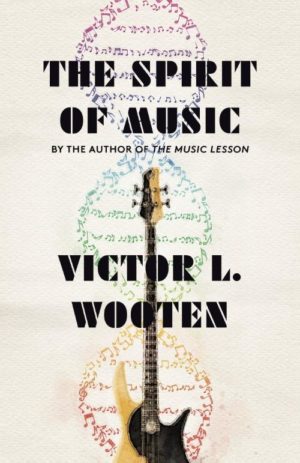 I’m pumped about that, too. I started on it in 2011 and then I put it down.
I’m pumped about that, too. I started on it in 2011 and then I put it down.
The first book, The Music Lesson, poured out because it was based on a class I had been teaching for years where I break the music up into 10 equal parts and show people that there are other things just as important as notes. We focus on the 12 notes and we’ve got theories around it and exercises and scales and modes and ear training, but it all pertains to 12 notes. My lessons were to not get rid of notes but to show that there were other things just as important.
I had been teaching that for a long time and people said, “Man, you need to write a book,” which is exactly what I didn’t want to do.
It does sound like a lot of work.
Well, the work is not the problem, it’s just that I don’t want something I’ve got to defend. As soon as you put something out there as your method, [people will argue about it]. I don’t want that.
I’ll share [my knowledge] with you. If you want a book, [you] write it. I always tell people if you learn what I say and you like it, then keep saying it. You can learn a Jaco line, but if you play it long enough it’s gonna become yours. It’s the same way you learn to talk by imitating your parents, but now you don’t sound like them. You’ve got your own voice. You’ve just gotta do it enough. So take what I say – I don’t claim it. Take it and say it enough to where it’s no longer what Victor Wooten said. It’s what you say, and then write your own book.
I realized that I could write a story, not an instruction book, and treat it like Star Wars or Mission Impossible or Avatar. The lessons are there if you want them and the lessons are real, but the story is fiction. Nobody’s arguing over if Luke is really Darth Vader’s son or if Yoda is real. Nobody is asking that, but everyone has been asking me “Is Michael real?” Who cares? Even if I say he was real, you weren’t there. It is just a story to you. It’s a story either way. But the thing for me is it released me from having to defend it. People can just learn the lessons or not learn the lessons, just read the story. It’s a good story.
It was the first thing I ever wrote story-wise, and I just enjoy that process. I had heard authors like Stephen King talking about how the characters start writing their own parts at some point, and I realized that was true. I put my mind in the mindset of Michael and I would learn. Michael would come out with stuff that I was like, “Where did that come from? That’s cool.”
That book came out in 2008 and after it was done I wanted to do another one. I started writing another book and it wasn’t flowing. I had ideas, but it wasn’t pouring out as the first one did, so I didn’t force myself and I put it down. It was many years later, maybe 2017, that I actually picked it back up. I started reading that stuff that I didn’t think was flowing and it was good. I had about 10 chapters, not finished, but I was like, “Whoa. There’s something here.” I started there again went ahead and finished it. It’s called “The Spirit of Music”. The lessons continue, basically starting from where the first book left off.
So it is really like a sequel.
It is a sequel, yes. We start exactly where the first one ended. At the end of the first book, you find out the narrator’s name is Victor, which I thought was gonna be a surprise to everyone and I realized everyone was reading the book as me, anyway. [laughs]
So Victor finds a student and his name is Jonathan. The story starts just before that, and you get to learn what leads Victor to Jonathan. It doesn’t all make sense in the beginning, but Victor goes to visit his parents in Virginia, which was literally where my parents lived. He meets a young student. You find out who the student is and why the student was there. All this stuff and the story starts there. There are a lot of new lessons in there.
And, again, it’s not lessons that you have to learn, but I learned a lot from some other movies. If you’re watching Star Wars and they say, “May the force be with you,” you can change the word “force” for whatever you want. You could say “may music be with you” or whatever, and at that point, it’s lighter. Some people might use God, the universe, life, whatever. I wrote a story like that where music’s the focus, but you can change it for whatever and the lessons still relate.
For people who have been to my camps, especially certain camps, there are things in the book just for them that will make more sense, so the book has layers to it. People know about me and my camps, especially a camp that I have called the Spirit of Music, will definitely have stuff in it just for them.
I don’t know if I’ve shared this in public yet, but I embedded or hid song titles from many of my records and other people’s records all throughout the story. I’ll do some type of contest like a word search for people to find and maybe there’ll be a prize in my store. I don’t know how I’m going to do it yet.
Speaking of your camps, you’re doing them online this year. How are those going?
Exceptionally well. Kind of surprisingly well, but it’s what we planned for. There have been a lot of benefits. It doesn’t replace being at Wooten Woods in Tennessee. We built the location specifically for our needs. I’m physically there 24/7 for everyone. We live there during the camps, but there are people who, for whatever reason, can’t get there. Maybe they can’t get a visa or afford tuition plus the flight to get out there. So we’ve been able to have more people than we do at Wooten Woods.
At our camps, we keep it to 60, mainly so I can spend time with every person in each group. Online, we’ve had a minimum of 100 for each camp. We can still break people into smaller groups using the Zoom platform if we want. You can talk to someone on the phone and feel their vibe and sentiment, so you can do even more on a video call. We’ve been making the most of it and learning the platform really well.
It’s been fun to see all the online bass happenings. I’ve caught a few of the webinars with you and Steve. Those are too cool. I was wigging out when Ron Carter was chatting up Anthony Jackson. What have been the highlights for you?
Getting to meet these new people. I’m getting turned onto people I didn’t know about and I’m meeting some I did know about but hadn’t met. We did one last Thursday called the Prince-Shed. I grew up on this music and I knew all these bass players. One of the guys on there was the keyboard player who taught Prince almost everything he knew. I was like, “Whoa.”
I’m also getting turned onto musicians from different styles of music, like the whole rock thing with Justin Chancellor. I got to meet Shavo Odadjian, so now I have a whole new band to check out and we have each other’s contacts. He lives in Las Vegas, so I turned him onto my guitarist buddy that we did Octavision with. The whole network grows because of this. I’m also a note-taker, so I’ve taken notes for all of them. It’s a real education.
How long will they go on for?
It’s totally up to Steve. It was supposed to happen once and it’s been every Thursday for at least two months. This week is the Dennis Chambers shed with him and a lot of bassists that worked with him.
I was just listening to Trypnotyx this weekend.
That’s a fun record. For a trio like that – bass, sax, and drums – I thought we did a great job with that. As musical as Bob Franceschini is, he’s able to play the bass parts to free me up. I had just gotten into this Fret Trax thing, so all the keys parts were played by me or by Bob on the sax. Dennis being Dennis, it’s just a blast. He’s such a musical drummer.
Speaking of music and Steve, you teased a while ago that you were working on the new Bass Extremes album. How is that going?
It’s going well, even though it’s slower than we thought. It’s partly because of these webinars. We were online with Justin Chancellor and all the sudden Steve texts me and says, “Hey, should we ask Justin to play a part on the record?” I said yeah. Steve likes to ask live on air so you have to say yes. [laughs] Steve just told me last night that Justin sent some more stuff. We keep adding to it.
It started out just being me, Steve, and Gregg Bissonette like the first one. Now John Patitucci will be on it and Justin and all these other people. It keeps growing and growing.
That’s probably the best possible reason to delay the release. Do you have any other new music coming?
One of the things I did just before this all hit was finished writing a second concerto for electric bass and orchestra. I was supposed to perform it in July, but fortunately for me, everything got pushed back until next year. It’s the second one I’ve written, but I co-wrote the first one called “The Bass Whisperer ” with a violinist and composer in Nashville named Conni Ellisor. We did it with five orchestras, and one of them commissioned me for a second one. As much as I love Conni and what a great opportunity it was, I wanted to try writing one myself. So I did and I love it. It’s based on my song “The Lesson,” which is tied to the book The Music Lesson.
Now it’s postponed to next year, which is good for me because I’ve been dealing with this really weird hand issue called dystonia that a lot of musicians have. What I wrote is not difficult for myself, but because of this dystonia, everything is really hard to play. This is giving me almost another whole year to deal with this and make my playing easier. That’s the main thing I’ve done, and I did that before the COVID pandemic. The only other things I’m doing musically are projects for a few close friends. I’m literally trying not to play as much as possible.
What are you doing to deal with the dystonia?
My wife found a woman online who is in Spain that I’ve been working with every week. She has some out of the box techniques.
If I say, “Hey, remember that time you and I got together back in 2010?” your eyes will go to a certain place to help you remember. She’s dealing with eye position and how it pertains to different memories and parts of the brain. She gets to the cause of what brings it on, where a lot of the people just try to treat the symptoms. It’s getting deep into what’s going on in the brain and looking at what was going on when I first started noticing it, figuring out what the stressors were in my life at that time, and visualizing it. We’re working to figure out if different eye positions increase or decrease my strength, and I’ve found that it does.
We’re doing that and visualizing. Studies show that when the brain visualizes something, it doesn’t totally know the difference between visualizing it and actually doing it. I can visualize my fingers working perfectly so it’s a way for me to practice with my hands without the dystonia.
Thanks so much for your time. Is there anything else you wanted to add?
Well, I just appreciate people. I’m a musician without people, but I have a career as a musician because of people. I owe my career to all of you who support me and all of us. Through all of your support, you’re literally connected to the fact that my kids can go to college. I really, truly, honestly appreciate that and I don’t forget it. So thanks to all the readers and the listeners out there for supporting my love of music.
And hopefully, people during this pandemic will make that list. Figure out the things you want to keep doing differently and keep doing it. That’s the way to assure we come back better than ever.

